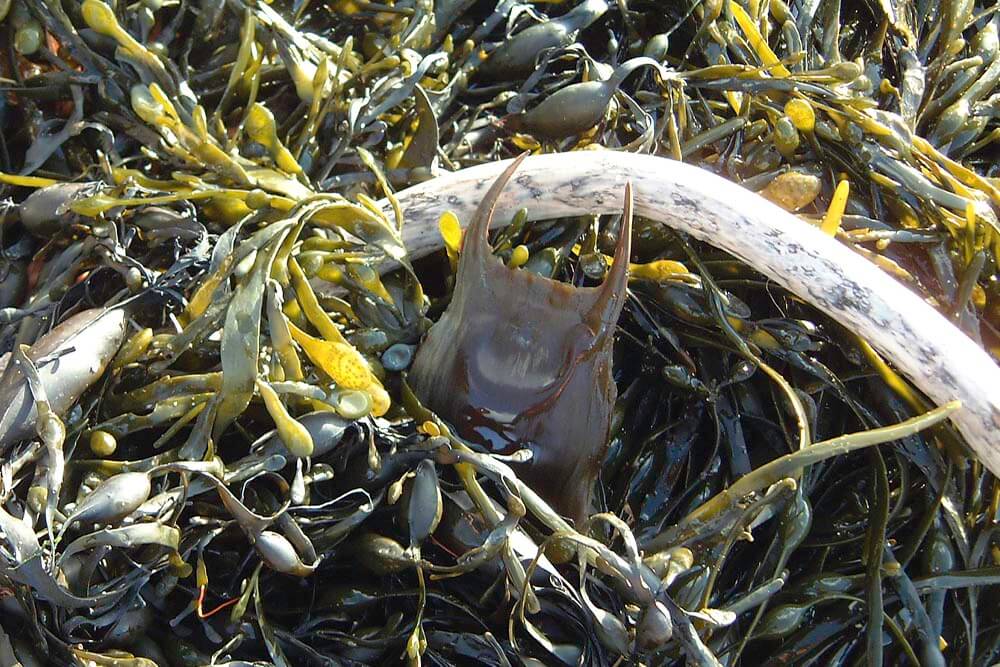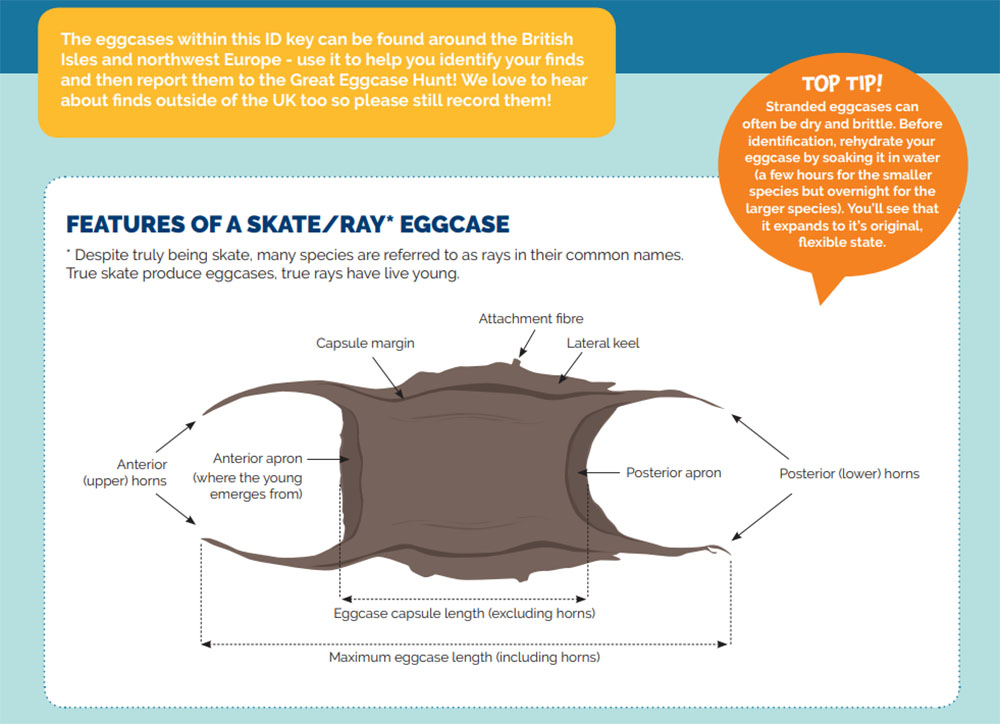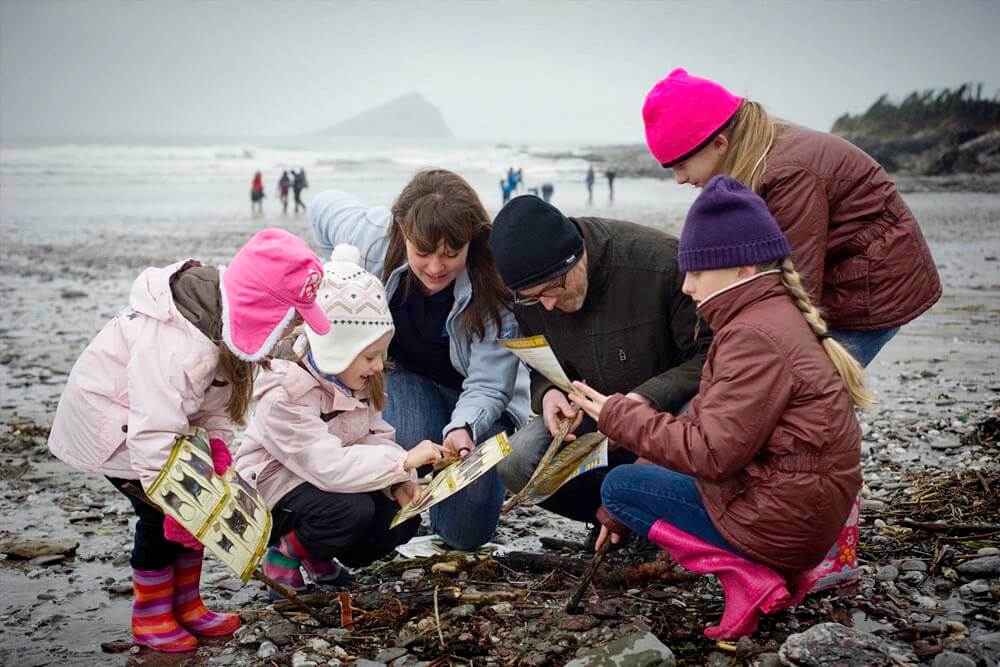
Every year, thousands of Easter egg hunts take place across the country, but if you’re looking for an activity to enjoy without all the excess chocolate, the Shark Trust has an Easter Egg Hunt with a difference. The charity’s Great Eggcase Hunt is not just a fun day out for the family, but also a big citizen science project that helps shark, ray and skate conservation.
‘The Shark Trust launched the Great Eggcase Hunt back in 2003, when a chance find on a Devon beach sparked the idea,’ said the Shark Trust’s Senior Conservation Officer, Cat Gordon. ‘Since then, over 300,000 eggcase records have been sent in from all around the UK and even further afield. New finds from around the world are regularly being added to an ever-growing database.
‘The project now has an impressive 43 species recorded from 29 countries,’ said Cat. ‘All this information helps us better understand species presence and diversity – it’s also a great way to get involved in shark conservation, and of course, it’s fun!’

Some sharks, and all true skates, reproduce by laying eggs. These are surrounded by a tough leathery capsule that protects the embryo as it develops inside. Small slits in the egg case allow fresh oxygenated seawater in, and let waste out, while a yolk sac provides plenty of nutrition. After a period of several months – which varies depending on the species – the eggs are ready to hatch. The top of the egg case will open and a fully formed shark or skate will emerge, where it will have to fend for itself from the moment of birth. Once empty, the egg cases, also known as ‘mermaid’s purses’, often wash up on the beach.
You don’t need to be part of an organised event to join in with an egg case hunt, although it’s worth checking the Shark Trust’s website to see if one has been organised at a beach near you. If not, all you need to do is head to your nearest beach to see what you can find. The best places to search for egg cases are in the strandline where seaweed and debris wash up, and in sand dunes behind the beach, as they often get trapped in the grass.
Snorkellers and divers can also join in the hunt by recording their underwater egg case findings. Underwater records help pinpoint exactly where sharks and skates are laying their eggs and can help link to beach records. Learning the depth and substrate that they lay on also helps better understand the species.

The egg cases of different species vary, but the Shark Trust has created some downloadable resources and guides to help you identify which species the egg case belongs to. Once you have identified the egg case, you can record your findings on the Shark Trust’s Recording Hub.
Paul Cox, the Shark Trust’s Managing Director, said: ‘In our 25th Anniversary year, we can look back at the many things that we’ve achieved with our partners and supporters over the years. The Great Eggcase Hunt is one of our defining projects. Thousands of people have joined in the hunt over the years and the project goes from strength to strength – it’s fun, easy and a great way to learn about local sharks.’
The Great Eggcase Hunt makes for a fantastic family day out at the beach, so get involved with shark conservation and have fun too!

Eggcase Hunting Tips
BEACH & WILDLIFE SAFETY:
- Check tide times
- Tell someone where you’re going
- If possible, use a stick to rummage in seaweed to avoid any nasty surprises
- Take care near the base of cliffs
- Respect wildlife and habitats by following the Seashore Code and don’t take live animals home with you
- Why not do a spot of beach cleaning while you’re there? It goes hand in hand with egg case hunting!
TIPS FOR HUNTING EGGCASES
- You can usually find egg cases amongst the seaweed that makes up the strandline. They blend in really well which means they can be difficult to spot at first, so keep your eyes peeled
- When egg cases dry out they’re very light and can get blown to the back of the beach. They also get trapped in grasses on sand dunes. So these are good locations to search.
- Egg cases will wash up throughout the year. They may have freshly hatched, or been on the seabed for some time before being dislodged.
- After stormy weather has passed is prime egg case hunting time. Lots of seaweed and debris will have been washed up on the beach – this is great to search in.
- Check to make sure it’s definitely an empty egg case and nothing is inside.
- If a live embryo is inside, pop the egg case back in the sea and try to weigh it down so it doesn’t wash ashore again.
- Empty egg cases have no secondary purpose as some shells do for hermit crabs. They also don’t break down to form sand.
For more information about the Great Eggcase Hunt, visit www.sharktrust.org/great-eggcase-hunt


